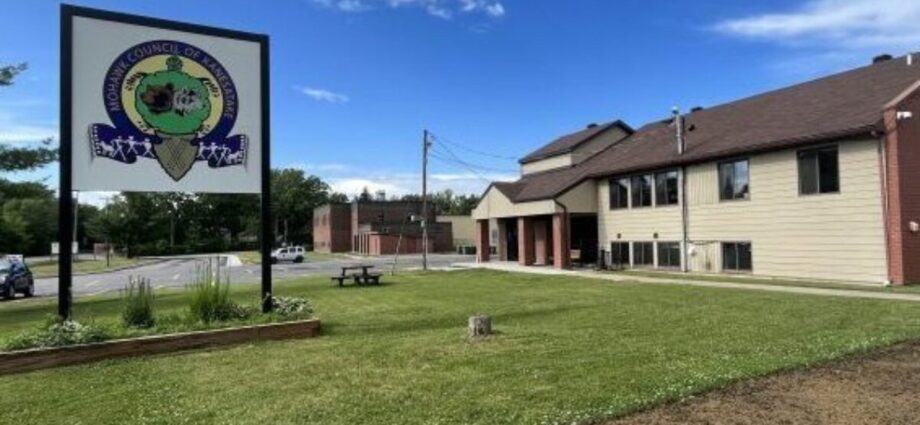
By Marcus Bankuti, Local Journalism Initiative Reporter, The Eastern Door
August 29, 2025
The law firm Dionne Schulze has filed a notice of application seeking clarity from the Federal Court on urgent issues stemming from the abrupt cancellation of the Mohawk Council of Kanesatake (MCK) elections.
The August 1 announcement by chief electoral officer Graeme Drew that the election that had been slated for the next day would be cancelled because of numerous irregularities, including as many as six ineligible candidates, left the community reeling.
While Drew had said upon cancelling the election that he believed the incumbent Council continued to hold authority and proposed that the Custom Electoral Code be revised prior to a new election call within six months, the incumbent Council’s authority was far from universally recognized.
In addition to contentious community gatherings in the days following the cancellation, MCK managerial staff announced on August 5 they would await clarity from Indigenous Services Canada on who’s in charge.
ISC proved unwilling to weigh in substantively, pointing the parties to court if Kanesatake’s governance issues could not be resolved internally. The result of the filing, dated this past Tuesday, August 26, could answer urgent questions on who has governing authority in Kanesatake.
“I’m confident the Federal Court is going to agree with us,” said incumbent Council chief Serge Otsi Simon, a candidate for grand chief in the stalled election. “It’s a very simple request. Are we a sitting interim government or not?”
Victor Bonspille, who was also running for grand chief and won the office last time around, did not reply to a request for comment. He, along with all the candidates who do not purport to be sitting chiefs, are respondents. Bonspille has been among the group pushing to call a new election without the cooperation of Council, which has so far raised questions on how it would be funded.
The group’s choice, Annie Neashish, is also cited as a respondent, alongside Drew.
Among other requests, the application seeks an order affirming the incumbent chiefs – Amy Beauvais, John Canatonquin, Denise David, Brant Etienne, and Serge Otsi Simon – continue to hold office, while requiring them to hold a special public meeting within 14 days to seek direction on whether their mandate should be extended for six months to make time to change the electoral code or if they should call a new election immediately.
Section 8.3 of the Custom Electoral Code dictates that Council may hold a special public meeting to seek authorization to extend its mandate by up to six months in exceptional circumstances.
To date, there has been no such meeting, nor agreement on whether the Council would be qualified to call one and how it would function.
The filing requests judicial review regarding Neashish’s alleged claim to hold the office of chief electoral officer, a claim she allegedly made in a letter to “all Kanehsata’kehró:non voters” according to the filing, which went on to say Neashish subsequently indicated that she and her firm have not acted as or purported to be the present electoral officer and that the letter was not sent to voters.
However, Neashish is said to have stated her readiness to take on the role “if a second members’ assembly confirmed it or if a court order were issued to that effect.”
According to the text cited in the filing, there were 87 Kanehsata’kehró:non who had signalled their wish for her to take over the election. This effort originated in front of the band council on August 2 at a meeting called by MCK grand chief candidate Victor Bonspille.
There have been multiple subsequent gatherings at which the prospect was discussed and steps agreed upon by those in attendance.
In their response, MCK lawyers argued that Neashish’s interpretation of Section 2.5, “The Kanehsata’kehró:non as members of the Mohawks of Kanesatake have the primary role in assuring there is good governance,” would override the code each time a small group launched an effort to do so.
Neashish has not replied to multiple requests from The Eastern Door to clarify her role and intentions in the election.
The application also seeks an order that Drew is no longer electoral officer, a position he has continued to claim to occupy.
The filing on behalf of the MCK said the incumbent chiefs had urged Drew to continue with the election when he broke the news to them he had decided to call it off, and characterizes his decision as naive.
“The cancellation of the election at the last minute caused understandable outrage and confusion in the community,” reads the filing. “Several community members and candidates saw it as a ‘ploy’ by the incumbent Council to ‘cling to power.’ This result was inevitable in given how highly polarized Kanesatake presently is and should have been foreseen by Mr. Drew.”
This week Drew said he was not aware of the filing, which has been obtained by The Eastern Door.

“Our services agreement has not been terminated and until that time, I remain the chief electoral officer,” Drew said.
“If MCK informs me in writing that they wish to terminate our agreement, then I will respond accordingly. I am awaiting the decision of MCK as to whether they are accepting my recommendations to amend the code or have another election with the existing code.”
He further indicated that he would not be willing to move forward with another election without changes to the code.
Another request in the application launched this week is for an order affirming that only Council can arrange for a chief electoral officer.
Finally, the filing poses alternative questions to be considered by the court, seeking clarity on the fundamental questions at issue, including what restrictions apply to the powers of an incumbent Council whose term is extended.
Subscribe to our newsletter.
marcus@easterndoor.com
Marcus Bankuti, Local Journalism Initiative Reporter

